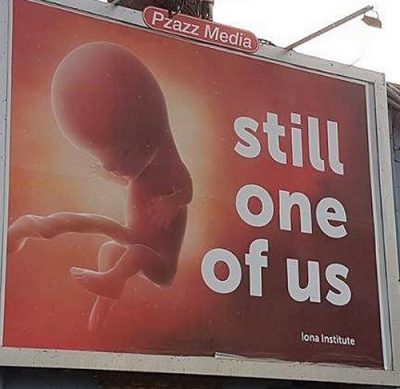
By Susan Gately - 24 May, 2019
 The Facebook decision to block an Iona Institute ad showing an 11-week-old unborn baby in the womb has been described as a “mistake” by the giant multinational.
The Facebook decision to block an Iona Institute ad showing an 11-week-old unborn baby in the womb has been described as a “mistake” by the giant multinational.
For two years running, the Iona Institute has used the image in their billboard and social media campaign – last year in the run-up to the referendum on abortion, with the title “One of Us”, and this year with the title “Still one of us”.
Ten billboards show this image in Dublin, Cork and Wicklow and it has been widely circulated on social media.
However, Facebook blacked out the ad after a few days, with a warning superimposed: “This photo may be sensitive to some people”. Users were given the option to click “Uncover” if they wished to view it. The warning was in place for about a week.
“It was a really terrible and indefensible move,” said David Quinn, Director of the Iona Institute. Blocking the image with a warning under the “violent or graphic content standard”, he said, brought to mind “ISIS videos, live streaming of terrorist attacks or pornography. What they were stopping was the image of an unborn baby in the womb, the sort of image that is routinely used on pregnancy websites based on the ultrasound scans that parents and their already born children are repeatedly shown every day.”
According to its website, Facebook applies “Community standards” to content. These prohibit content that:
An additional category is “Violence and Graphic content”, which includes “Imagery of fetuses that show: Dismemberment, An abortion or abandonment context and Imagery of newborn babies in an abandonment context.”
In a statement to the Irish Catholic, Facebook said: “In this instance we made a mistake in applying a warning screen over the image used in The Iona Institute’s ad. We have removed the warning screen and apologise for any inconvenience caused.”
Mr Quinn told CatholicIreland.net that he welcomed the apology. “We were concerned to get the decision reversed. This wasn’t just about Iona because obviously a decision by a very powerful organisation like Facebook to declare it to be ‘graphic or violent content’ would affect the ability of all pro life organisations to show and promote such a positive image.”
The story was reported in Ireland and internationally, with the Washington Times running a story headlined: “Developing child too graphic for Facebook; pro-life image blurred with warning notice” on 15 May. “Facebook has deemed the image of a developing child in its mother’s womb too ‘sensitive’ to view without warning,” began the story by Douglas Ernst.